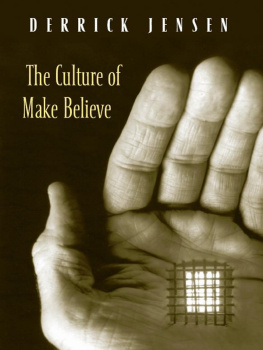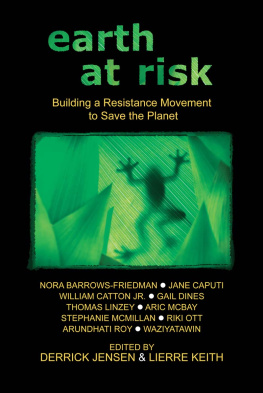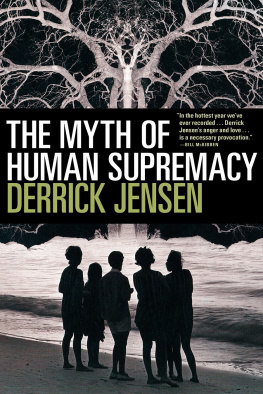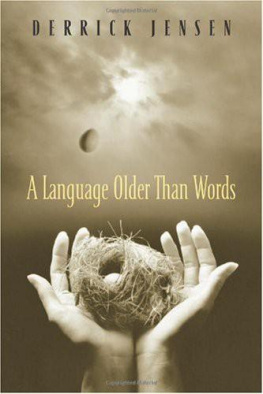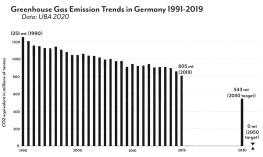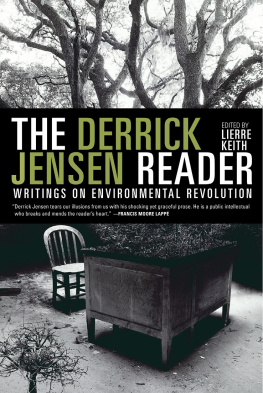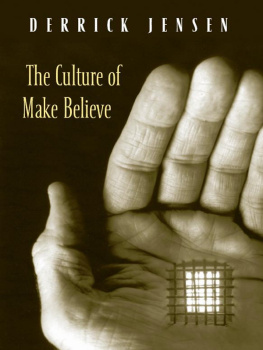The Culture of Make Believe
Also by Derrick Jensen
Walking on Water: Reading, Writing, and Revolution
Strangely Like War: The Global Assault on Forests
(coauthored with George Draffan)
A Language Older Than Words
Listening to the Land: Conversations about Nature, Culture, and Eros
Railroads and Clearcuts: Legacy of Congresss 1864
Northern Pacific Railroad Land Grant
(coauthored with George Draffan)
The Other Side of Darkness (live CD)
Standup Tragedy (live CD)
The Culture of Make Believe
DERRICK JENSEN
CHELSEA GREEN PUBLISHING COMPANY
WHITE RIVER JUNCTION, VERMONT
Copyright 2002, 2004 by Derrick Jensen
All rights reserved. No part of this book may be transmitted in any form
by any means without permission in writing from the publisher.
Designer: Julie Burke
Printed in The United States
10 9 8 7 6
Library of Congress Cataloging-in-Publication Data
Jensen, Derrick, 1960
The culture of make believe / Derrick Jensen.
p. cm.
Originally published: New York : Context Books, 2002.
Includes bibliographical references.
eBook ISBN: 978-1-60358-183-7
1. Racism. 2. RacismEconomic aspects. 3. Race relationsEconomic
aspects. 4. International economic relationsSocial aspects. I. Title.
HT1523.J46 2002b
305.8--dc22
2004001631
Chelsea Green Publishing Company
Post Office Box 428
White River Junction, VT 05001
(800) 639-4099
www.chelseagreen.com
CONTENTS
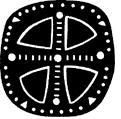
IN 1918, the husband of Mary Turner, a black woman from Valdosta, Georgia, was killed by a mob of white men, not for any offense he had committed, but rather because another black man had killed a white farmer. I do not know precisely how Turners husband died. I do not even know his name. I know only that in retaliation for the killing of the white farmer, many white citizens of Valdosta lynched eleven black menwho were simply in the wrong place at the wrong time with the wrong color skinbefore they shot and killed the man they were after.
In the wake of her husbands murder, Mary, who was eight months pregnant, vowed to avenge him. An Associated Press article later commented on her unwise remarks, noting that the people, in their indignant mood, took exception to her remarks, as well as her attitude. If you dig beneath the delicate language, it is easy to see what was coming. A mob of several hundred white men and women determined they would teach her a lesson, or, perhaps more precisely, they would teach a lesson to those others who might be tempted to act as she did. They tied her ankles together and hung her upside down from a tree. Then they doused her clothes with gasoline and burned them off of her. They used a hog-splitting knife to open her belly. Her infant fell to the ground, and cried briefly, until someone crushed its head with his heel. The mob then shot her, not once or twice, but hundreds of times.
Now, lets remove ourselves from the emotionally safe dustbin of history to another death that happened in 2001. This person who diedI do not know her name, or very much about her except that she was seventeen years oldwas one of about forty people killed over Easter weekend in Alto Naya, in Colombia. Her killers were what these days we call a death squad. I do not know what the members of the death squad said to her or the other people from her village before they killed her any more than I know what the members of the mob said to the husband of Mary Turner. I do not know what they were thinking, or feeling, nor do I know the set of their faces. I do not know whether they laughed, or spat, or whether they were simply doing what they felt needed to be done. I know only that when her body was later exhumed, it was discovered that members of the death squad had cut off her hands with a chainsaw, and used that also to open her belly and throat.
It is as easy as it is unwise to simply throw up our hands in the face of these acts, declare them incomprehensible or, just as safely, having nothing whatsoever to do with any of us. Ive never stuck anyone with a knife, nor even aimed a chainsaw at a human being. I just dont understand how someone could do this. Maybe theyre just evil.
But are the actions really so difficult to understand, and do they really have nothing to do with us? What do we make of the fact that in the aftermath of the killing of Mary Turner and the others, five hundred black people quietly and quickly left Valdosta for greener (or at least safer) pastures, leaving plenty of fine farmland ripe for new tenants, including those who never held a rope, gun, or knife? Similarly, is it significant that in Colombia, U.S. oil companiesincluding a company for which George W. Bush was a board member before becoming president of the United Statesoperate in the regions where these death squads kill most routinely?
The texture and direction of this book was deeply informed by the deathsthe killingsof these four human beings, and by a desire to understand not only the meanings of these deaths, but the threads that tie them together. What is the precise relationship between our economic system and hate? Is there a relationship between economics and race? If so, what is it? And as long as were delving into the destructive activities of our culture, what about our seeming antipathy toward women? Why, also, I wanted to know, the shift in the frontier where the most grotesque of these atrocities are committed? Thousands of black men and women were lynched in this country in the first twenty years of the twentieth century. Not so often, now, though, do we see black men hanging long-necked from lamp posts. Is this country now color-blind, as much mainstream discourse would have us believe? For that matter, is color-blindness a good thing? Are there certain economic and social conditions that facilitate, even call forth, certain forms of atrocity, and are there other economic and social conditions that require other forms of making certain that peoples attitudes do not become too unwise?
There is something else I have wanted to explore while writing this book, having to do with perception, or rather the lack of it. Lets be honest. The activities of our economic and social system are killing the planet. Even if we confine ourselves merely to humans, these activities are causing unprecedented privation, as hundreds of millions of peopleand more today than yesterday, with probably more tomorrowgo their entire lives with never enough to eat. Yet curiously, none of this seems to stir us to significant action. And when someone does too stridently point out these obvious injustices, the response by the mass of people seems so often to be that which was meted out to Mary Turner, a figurative if not physical blow to the gut, leading inevitably to a destruction of our common future. Witness the enthusiasm with which those native nations that resisted their conquest by our culture have been subdued, and the eagerness with which this same end is today brought to thosenative or notwho continue to resist too strongly. How does this come to happen, in both personal and social ways?
My book A Language Older Than Words was a deeply intimate exploration of, among many other things, the complex relationship between domestic violence and how this violence tricks out on a grander social scale. This book you hold in your hands is not quite so personal, in great measure because while I suffered directly from violence within my familymy father raped my mother, my sister, and me, and beat everyone in my family but meI have not suffered from, but rather at least indirectly benefited by whatever racism exists in our society. So in some senses this book is more about racismand, far more broadly, hate as it manifests in our Western worldfrom the inside. I have no interest in reproducing
Next page
